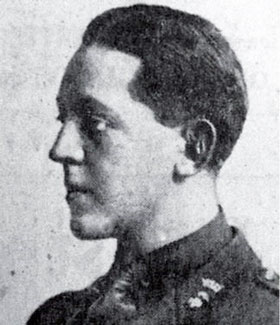Lieutenant-Colonel Herbert Shelton Dean, MC

Herbert Shelton Dean was born at Kettering, Northamptonshire, on 17 July 1896, son of chemist and druggist Herbert Dean and his wife Eleanor Susannah (nee Shelton).
He enlisted in a territorial regiment in May 1915, before being commissioned as a 2nd lieutenant and posted to the Prince of Wales's Own (West Yorkshire Regiment) on 21 October. Soon after he transferred to the 10th Reserve Regiment of Cavalry at the Curragh and on 28 March 1916 was posted to the 6th (Inniskilling) Dragoons.
On 9 August 1916 he embarked for France and four days later joined the 2nd North Irish Horse Regiment at Flesselles, where he was posted to B Squadron. Through 1916 and 1917 there are a number of references to Dean in the regiment's war diaries, including a brief attachment to the 18th Lancers and his command of a number of trench working parties. On 1 July 1917 he was promoted to lieutenant (later backdated to 10 May 1916).
In September 1917 the 2nd NIH Regiment was dismounted and absorbed into the 9th Battalion, Royal Irish Fusiliers (renamed the 9th (North Irish Horse) Battalion). Dean joined the new battalion on 2 October. He was made acting captain later that month.
Dean saw action at the Battle of Cambrai in November and December 1917 and in the Retreat from St Quentin in March 1918. He was later awarded a Military Cross for "conspicuous gallantry and devotion to duty" during the latter action:
When all the troops on his left had retired, this officer held his position with great determination, subsequently falling back and protecting the left flank.
On 12 April 1918 he was wounded in the fighting near Wulverghem and evacuated to hospital in England. He recovered from his wounds and served out the remainder of the war with the North Irish Horse reserve at Antrim.
He was demobilised on 27 July 1919 and relinquished his commission on 1 April 1920, but the following year joined The Royal Ulster Rifles as a lieutenant. On 1 April 1926 he was promoted to captain and by 15 January 1938 had reached the rank of major, having served through the 1930s in India and Palestine, and being mentioned in despatches.
By the time he retired on 30 July 1948, Dean had reached the rank of Lieutenant-Colonel. He was awarded an OBE (Military Division) on 1 January 1947.
Lieutenant-Colonel Dean died at Eton, Buckinghamshire, in 1969.
Image sourced from the Imperial War Museum site Lives of the First World War - contributor 'LIZ37211'.
